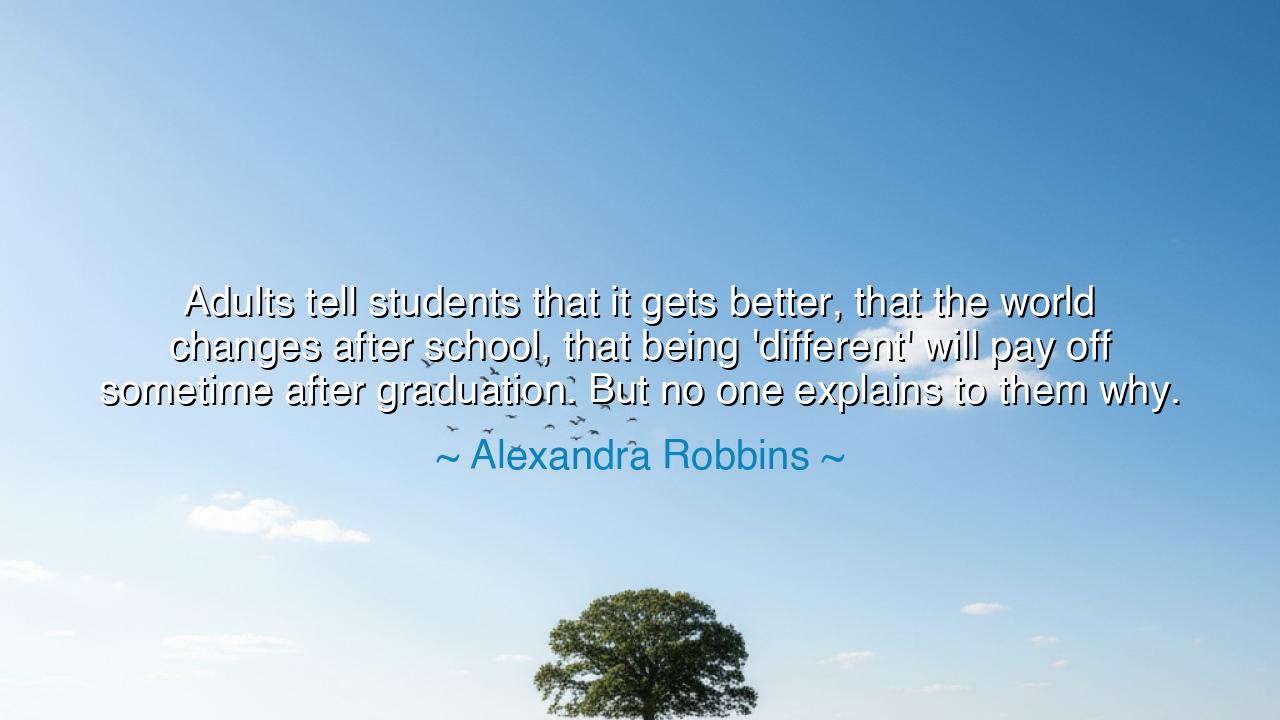
Adults tell students that it gets better, that the world changes
Adults tell students that it gets better, that the world changes after school, that being 'different' will pay off sometime after graduation. But no one explains to them why.






Hear, O child of the present age, and lend thy ear to the whisper of eternal truth. The words of Alexandra Robbins are not a mere lament — they are a mirror held before the weary faces of youth: “Adults tell students that it gets better, that the world changes after school, that being ‘different’ will pay off sometime after graduation. But no one explains to them why.” In this utterance lies both sorrow and revelation. For it is the fate of many young hearts to dwell in confusion, hearing the promises of hope but seeing no proof, being told of light beyond the horizon but left blind in the valley of shadows.
In the schools of the world, where conformity is praised and the unique soul often silenced, the young suffer beneath invisible burdens. They are told, “Be yourself,” yet punished when their truth shines too bright. They are promised, “It gets better,” but the path to “better” is veiled in mist. The adults, weary travelers who have forgotten their own trials, speak the words of comfort but not the wisdom of endurance. They forget that to a child, a year is eternity, and that hope without understanding is like bread without nourishment.
But the wise know the why. The world of youth is a closed garden — small, enclosed by walls of judgment and sameness. In that garden, the flowers that grow tall are mocked by those who remain low to the ground. Yet beyond those walls stretches a vast and open field — the world of adulthood, where difference becomes power, where individuality finds its voice, where the strange and the misunderstood become inventors, artists, and leaders. What the elders fail to say is that time itself is the great transformer. With age comes distance, and with distance comes vision. The suffering that once seemed endless becomes the forge that tempers the soul.
Consider, O reader, the story of Nikola Tesla, the boy who dreamed of lightning. In his youth, his ideas were scorned, his brilliance dismissed as madness. Teachers mocked him for thinking beyond the textbooks. Yet he did not yield. The very strangeness that isolated him became the wellspring of his genius. In time, the world that once called him foolish came to depend upon his creations — the currents that power our cities, the sparks that light our homes. Thus, the different one, ridiculed in youth, became a master of the modern age. It did get better — not by chance, but because he endured long enough for the world to catch up to his vision.
And so it is for every young soul who feels apart. The pain of being misunderstood is the tax one pays for the gift of originality. The crowd fears what it cannot name, and youth, bound by the need to belong, often flees from its own greatness. But the day will come when the crowd no longer holds sway, when the world will hunger for new ideas, new courage, new truth — and then, the “different” ones shall rise, like dawn after a long night.
Let the lesson, therefore, be carved upon the tablets of your heart: It gets better not because the world changes, but because you do. The storms that batter you in youth shape your wisdom, your patience, your power. The mockery that wounds you today will one day be the proof of your authenticity. When you cease seeking to fit in, you begin to stand out — and that is the soil from which greatness grows.
So, O seeker of self, do not curse your difference — cherish it. Let your pain become your teacher, your isolation your sanctuary, your strangeness your song. For every soul who endures the trial of being misunderstood walks the same road once trod by prophets, poets, and pioneers. Take heart, for the path of the uncommon is not meant to be easy — it is meant to be eternal. And when the voices of doubt surround you, remember the truth that others forgot to tell you: it gets better, because you are becoming better.






AAdministratorAdministrator
Welcome, honored guests. Please leave a comment, we will respond soon